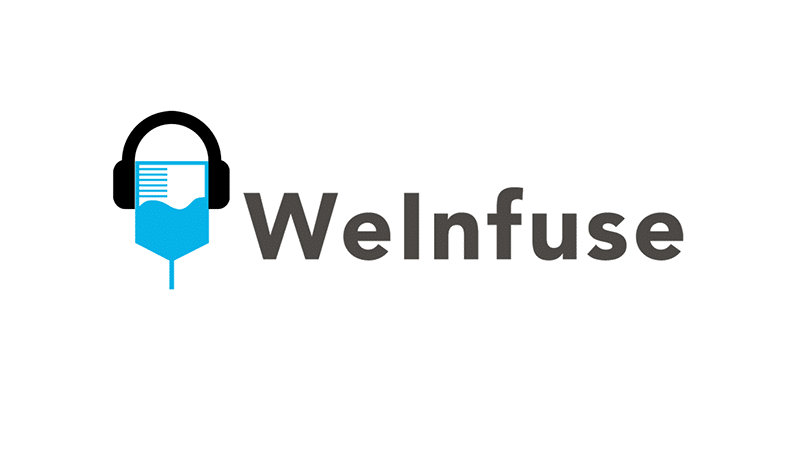In our very first Podcast, Dylan McCabe interviews Bryan Johnson, Co-Founder and CEO for WeInfuse. Hear Bryan’s story of how he started in the infusion industry by opening his own managed and later wholly owned stand-alone Infusion Centers. Bryan shares advice for navigating the challenges in this unique health care model and gain form helpful insights for your own in-office infusion suite or infusion center.
Follow on Amazon Music II Subscribe to Podbean II Subscribe to iTunes
Transcript: Learn how WeInfuse was born with Bryan Johnson
Dylan McCabe: WeInfuse Podcast, episode number one. All right. Welcome to the WeInfuse Podcast where we take the confusion out of infusion and our goal is to equip you with tips, tools, and a roadmap, whether you have a current practice in place, or you’re interested in starting one, whether you are an entrepreneur, a nurse, or an administrative professional, our goal is to equip you so that you can streamline the processes you have in place and have a thriving, successful infusion business. Today I have a special guest joining me on the show. He also happens to be my boss and his name is Bryan Johnson. So Bryan, thanks for being on the show.
Bryan Johnson: Thank you. Glad to be here.
DylanMcCabe: All right. So for those of you just listening in, this is our first episode, so please ignore any crazy sounds in the background or, any mishaps, but we’re excited to launch this podcast. We’re excited to connect with you all and we’re really excited to just have this platform to equip people in this incredibly confusing, challenging but also, very important business model and line of therapy for those patients out there. What I would like to do in this first episode is really just give Bryan the chance to kind of share about your background and share a little bit about your journey in the infusion space and why you started WeInfuse.
Bryan Johnson: All right. Thank you, Dylan. We’re excited about this podcast. Thank you all for joining us. It’s not really exciting. I got started in the infusion business by a business mentor actually, while I was in college at Baylor University, sickle bears. Learn the business by doing all the little small menial roles that a kid out of college probably needs to do before being given the bigger ones. So I slowly worked my way up in the business as I was proving myself in the small things and eventually launched my own infusion center down in Austin, Texas. Which is really where I would say I cut my teeth on the infusion business, because it was all my responsibility at that point. Now we are here 15 years later, I’m still working in this amazing healthcare channel and still learning every day.
Dylan McCabe: That’s great. So for you and Reece, Reece was your partner throughout most of that time, right?
Bryan Johnson: Part of the time. Yes.
Dylan McCabe: With you and Reece, just to give our listeners an idea, how many infusions were you guys running through your business on a monthly basis?
Bryan Johnson: I don’t know. I always felt like it’s more than probably it actually was, but I think when we sold the business a few years ago, it was around the 2000 treatments a month through those locations.
Dylan McCabe: Two thousand was that multi-specialty, you guys are doing rheumatology, neurology, drugs, all the above.
Bryan Johnson: Everything through a needle, as long as it wasn’t chemotherapy, you stayed away from that because it scared me.
Dylan McCabe: What guided you guys, obviously dealing with the challenges that you faced,what was the pain point to where you said we need some sort of software to help us manage this workflow?
Bryan Johnson: The working industry wasn’t any real application to do what we were doing, kind of like other industries where you could go online and Google, Software for a restaurant software or auto body shop software. We would Google infusion software and nothing would come up and we had kind of cobbled together a handful of systems like most entrepreneurs do to make things work. I think when we got past the six or seven systems, we started to realize how to grease. Maybe more importantly started to realize that we were, we were really starting to go the wrong way, and this was never going to scale. It was just going to be too expensive, just from an overhead standpoint to do it. That was our biggest pain point. I think we realized we were losing money between those systems and so reset foresight to say, Hey, I know we’ve never built software, but no one else is doing it. Let’s go do it and so we really built the software to help. We start addressing that pain point.
Dylan McCabe: That’s great. Many of our listeners know right away what that pain feels like, obviously with all the moving pieces and inside of WeInfuse, coming with a background, running infusion centers, and having a different education that you have and just being an entrepreneur. What would you say is your main area of expertise right now?
Bryan Johnson: Now I would say it’s processed. I’m getting more and more dedicated to that. So infusion has every one of our listeners know is very complex, it’s very risky financially. But my experience over time, probably more through pain than anything else has taught me that that complexity is best handled through really great processes so that you have repeatable things that you can do over and over again and sort of guarantee the same outcomes. So I say my expertise now is really in understanding the process that needs to take place in order to go from a physician’s order all the way to a paid claim and do it safely and do it efficiently and do it effectively.
Dylan McCabe: What’s one thing you would want our listeners to take away from what you’ve learned up to this point about your main area of expertise?
Bryan Johnson: Well, as I said before, the infusion is complex and it’s financially risky and so it doesn’t mean you need to run away from it. It just means that if you’re going to work in this exciting space, you really need to commit yourself to do it well. Don’t tell people to try, I’m going to do an infusion center aside and never, and I’m going to try to save a few dollars by cutting corners on the systems and the processes. I think that’s a bad idea, you’re just headed towards a bad outcome if you do that. If you’re going to take anything, I would say dedicate yourself and your time to really learning the business and building really great processes and you’re going to do great and you’re going to help a lot of people that need it.
Dylan McCabe: That’s great, with people involved in this kind of business, it’s easy to have. I mean, as we know it, WeInfuse we get multiple calls and have multiple, we’re holding demos so frequently that we hear all the issues that people deal with and the challenges they face. I mean in this business model, there are their successes. There are also failures. There’s a lot of challenges in between share with our listeners. Obviously WeInfuse is a great story, you guys have a great story. It’s a story of success, why don’t you share with our listeners who are thinking that sounds great. We’re glad you have expertise. You guys are on top of things, but I’m struggling badly over here. So what’s one story that you could share of just a challenge that you faced. Take us there, let us know about a challenging part of a struggle you have had during your journey into the infusion business.
Bryan Johnson: Yes, it was quite a few of course. As you said, maybe the listeners probably understand themselves. I would say one that’s most, probably the best example of really what you need to deal with is we were around doing a fusion back in the early two-thousands, where we had a major payer change in 2006, Medicare modernization XR, the entire financial model for the business changed literally within a year. They felt like it was overnight. So we really had to be flexible and deal with that change and for a lot of the other infusion providers out there, they got out of the business around that time and so I would say that story probably too long to go into here, but the moral of that story is you have to be very comfortable dealing with change and being flexible. I mean, you’re working with payers, you’re working with Medicare and this business, which means at least a few times a year, you’re going to have a curve ball thrown at you and so you really, it’s important to not only personally, but in your culture with your team, develop that culture so that it expects and tolerance change in the dynamic environment that we’re going to be in. I think that’s key if you’re going to overcome the challenges that you know exist today and the challenges that you’re not anticipating coming tomorrow.
Dylan McCabe: That’s great and that kind of leads right into my next question, how can we mine some gold from that challenging experience you guys went through that our listeners can take away. It sounds like what you might say is they need to stay on the cutting edge of all the new policies and procedures coming out and then stay flexible.
Bryan Johnson: I would say build that culture change. One of the things about dealing with change is you need to see it coming, I guess as much as you can as well. So like you said, stay on top of the policy, stay on top of procedures. There are several organizations, definitely one we recommend the National Infusion Center Association, that’s their full-time role. So definitely look them up or at least what I’m learning is don’t spend so much time focused on your own business that you’re not continually learning. As I said, don’t let competitiveness get in your way. I wrote that down here as something I wanted to say. But I’m fortunate now I get to spend a lot of time going to other infusion centers all across the country. The real gold in that process or that opportunity that I have is learning all the other ways you can solve problems that other people have already worked out. If you’re running your business, you’re running your fusion business, you’re kind of staying in your own little hole in your own little corner, not communicating with other people in your industry, your peers, your competitors, you’re going miss out on that opportunity to share and collaborate and I think it’s through collaboration, sharing of ideas that the industry is going to move forward. So don’t pigeonhole yourself and not communicate with your competitors, with other people in the industry, especially colleagues, because you’re worried about competition or you’re worried that something you’re doing might get out, so get out there and see what else is being done. I think that’ll go a long way to keeping you flexible enough to date about change.
Dylan McCabe: That’s so good. That applies across any business, right? I remember a mentor I had in college told me to read as many books as I could. This is why I have a wall of books in my office, but he said, what’s going to separate you between what’s going to separate you and all these other students and he told me one of the easiest ways is continual learning. I mean, we all stand on the shoulders of others and it’s definitely that way in this kind of business model, this kind of practice. So, well let’s share another story with what you’ve experienced so far in this business. What’s one of the biggest light bulb moments you guys have had?
Bryan Johnson: Well, I think we had it, kind of going back to our 2006 and our other stories or other previous comments around getting the technology together in our own practice, in our own infusion business. But now we’re a technology company. So we work very hard and WeInfuse that creating, applying great technology to solve these industry problems that we’re talking about, dealing with complexity, dealing with complicated multi-step processes. It is important as that, as that is. I think what I’m been learning, I’m still learning is how important it is to take the time to train and educate our clients and their teams and if you’re an infusion provider, of course, this is your own staff and your own teams, your own clinicians on why these processes are so important. You’re not at the technology click here and do this and this is how you take a patient from an order to an infusion, but really take time to educate them on why we’re doing that. How did we get here? Why is it important that we take these steps? I think it’s just something I’m really understanding is that we’ve been in the industry for a long time. I know most of these processes, I know most of this stuff by heart, but many of our clients, their users are just getting into this space. So that education component of what you do is just as important as the technology application. So don’t skip out on that. There’s no, no technology. That’s going to solve all your problems. You really have to communicate and educate your people on what you’re doing.
Dylan McCabe: What would you say, and this is, this is not something I even plan on asking, but when you look at an infusion practice, typically have an office manager, you’ve got your nurses, your doctors, your patients, and all that stuff. What would you say is one of the risks of setting it up poorly? Or maybe what’s the best way to set up a healthy practice to where you are staying on the cutting edge, a curve ball, not going to totally take you out. I mean, what would you say is just kind of a big picture of the best way to go about it?
Bryan Johnson: I think patient care is a team sport, and you can’t really the best outcomes always come through the mass, through the knowledge, the sharing of knowledge through the teamwork that goes on in that practice. I think, your team is educated. The more your team is involved, and enable to be a part of that process. I think it’s going to go a long way, because those are where the cutting edge ideas come from. They come from the medical system, he’s interacting with the patient, taking weight and vitals. It comes from the front desk person who’s checking the patient in, who may be receiving inventory. In this multi-step process there nearly everyone in the practice is going to touch that infusion patient at some point and so having them engaged and involved and enabled to communicate and be a part of improving that process. I think that’s probably the most important thing you can do and it’s really the lowest hanging fruit. It doesn’t require any technology or anything to talk to your people. So get them involved in the process and get them at the table and say, how can we do this better for our patients? And you need to be that group of ideas is what’s going to make that process work really well.
Dylan McCabe: That’s what people want, right? I mean, whether I’m going to the doctor or getting my oil changed, I really just want somebody to be friendly with me and to feel like they really care about my businesses or customer, and they can even make mistakes and I’ll come back because of the strength of that relationship. So it’s a critical principle there. Let’s switch gears here. Let’s tell our listeners what you’re most excited about right now in the infusion industry.
Bryan Johnson: Besides this podcast, Dylan here. I think I’m most excited and technology person on a process kind of person wired that way, I like to solve problems. I’m really excited about seeing this convergence of technology and healthcare, healthcare as been stuck. I feel like in the dark ages for years, all these other industries are moving on. I mean, cars are going electric and banks pretty much do everything on your phone now and healthcare is still faxing things and doing a lot of work on paper. So I’m excited to finally see some momentum behind that and here we views. We are the technology we have today that we’re applying. These problems are very exciting and it’s just, I’m fascinated by how it’s changing practices and this process for the patients every day, but I’m more excited about what we can do tomorrow. So the things we’re working on right now, the things we have on our roadmap for the coming weeks, months, and years, it’s going to make this just a much better process for everyone and help us to truly take the confusion out of infusion.
Dylan McCabe: It’s an exciting time and I obviously know from personal experience, when we infused in the hands of practice and they get the process is streamlined so much and simplified so much. I mean, it really makes it makes the employees or the staff members live better and it makes the patient’s life better too because it forces best patient care, of course, we can go on and on about how great WeInfuse is, but I’m want to give just kind of like one last parting piece of advice. What would you want to say to our listeners?
Bryan Johnson: I just said to pay attention to it. A lot of our clients are busy physician offices that also have infusion centers or there are pharmacies that have infusion as a line of business. I would say, make that you’re dedicating some resources to that. Someone needs to own that part of the process and make it an important focus. It’s probably the number one expense, if not a revenue line in your practice, it’s not today, it will be in the future. So you really can’t afford to ignore something that important. So pay attention to it. Obviously have great processes if you want to get those processes really quickly and easily, of course, just by reviews, that will go a long way. So I’ll put that shameless plugin since it’s our podcast but focus on it. Don’t do it as a side thing, don’t put your least qualified person in the office in charge of one of your most important assets. Equip it correctly, spend the time on it, spend the right money on it, and you’ll be very successful and you’ll have a thriving piece of the patient access puzzle. They will be solving for patients everywhere.
Dylan McCabe: That’s so good and for those listening to you, if you have not been exposed to WeInfuse yet, we strongly recommend you go to the website WeInfuse.com and schedule a demo through our website. WeInfuse at the time of the recording of this podcast is the first and only infusion center software that ties every major aspect of the infusion practice from initial patient intake to scheduling to an infusion nurse’s note to inventory management, ordering, and reports and reconciliation all in one place. So the days of having sticky notes on your computer and Excel spreadsheet and a calendar and an EMR and all these other systems trying to get them to work together, and the challenge that you deal with in that those days are gone. Now you can have, WeInfuse that simplifies every aspect of the practice. So definitely check out our website. WeInfuse.com like Bryan said, for more resources, we’ve got a blog with great articles that are written by our founders and they can equip you on the different aspects of the infusion practice. Also, the NICA that Brian mentioned earlier, the national infusion center association is a great resource as well. There’s even an infusion center locator on their website that ties up our podcasts or that wraps up our podcast for today. So, Brian, thanks for being on the show.
Bryan Johnson: Thank you.
Dylan McCabe: All right, guys, thanks for joining us on the WeInfuse podcast where we take the confusion out of infusion and next episode, we’re going to be talking with Brian Nyquist from NICA and we’re going to give you guys even more just behind the scenes look, even at a policy level of what’s in the pipe for the infusion practice. We’re going to be interviewing industry leaders across the board in this podcast and hope to have episodes out to you guys about every two weeks so stay tuned and if this has been helpful, please go to iTunes and rate and review. It really does help get the word out so other people can take the confusion out of their infusion practice. This is Dylan McCabe with the WeInfuse podcast. Thanks for joining us and we will catch you in the next episode.
Guest Speaker: Bryan Johnson, Co-Founder & CEO of WeInfuse, and CEO of RxToolKit, has dedicated his career to addressing and overcoming the challenges of the infusion delivery model. He is also a founding member of the National Infusion Center Association (NICA), and now serves as a Board Member.




